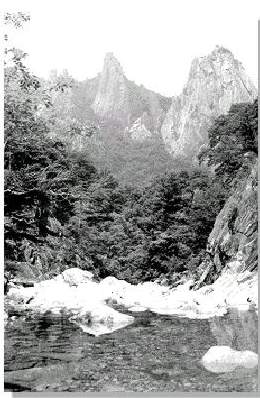SOBER THOUGHTS ON SORAKASAN
by Sheila Windle
 Korean people
are always telling me where to go. I have to admit, however, that I ask
for it. Eager for adventure, I usually consult Korean friends when seeking
guidance about my next travel destination. So well do these people know
and love their land, there is no need to consult a travel agent. Korean people
are always telling me where to go. I have to admit, however, that I ask
for it. Eager for adventure, I usually consult Korean friends when seeking
guidance about my next travel destination. So well do these people know
and love their land, there is no need to consult a travel agent.
Soraksan leads in their recommendations. Situated about
50km south of the North Korean border and a few kilometres west of the
East Sea, Sorak San (Snow Peak Mountain) is one of the most popular domestic
holiday spots in Korea. The mountain and South Korea’s second largest national
park bear the same name. South Korea’s northernmost national park also
houses its third-largest peak, Taech’ong-bong (1708 meters).
Immense gray granite rocks crown Sorak San. Ominous yet
gentle, these giants bid you visit their glorious natural castles. If you
want to see the best of Korea, make the journey. A hike in the dynamic
topography of this national park is guaranteed to leave a strong impression.
Another part of the trip, however, may leave a different
impression. Within less than 100 km of the North Korea border, the coast
is visible only through an eight-foot-high fence topped with barbed wire.
Through the steel diamonds of this mesh barrier, the dazzling East Sea
becomes a menacing mass of dangerous liquid; the sand, a prison floor;
the roll and rumble of waves, a thunderous warning.
It is baffling to think that the people of North Korea
and South Korea, one in the same just 55 years ago, now stand on either
side of the Demilitarized Zone, guns aimed and ready. It is sad to think
that the division of this land came as a consequence of deals struck, not
within Korea, but by agents and agencies far removed from this beautiful
location.
The fence, silent, still and cold, speaks years of history.
That history, manifested in part by this structure, is shaping lives today,
forbidding anyone who travels this way the luxury of imagining that all
is well. Yet if you let your imagination run further, perhaps it speaks
to the future as well. Our best hope is that this barrier will not remain
forever.
|